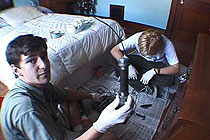|
|
|
|
Zero
Day
|
 |
|
Films based on tricky conceits are often hard to pull off. Few moviegoers remember, for instance, La tarea (1990), a low-budget Mexican movie showing a couple's battles from a single, static angle – supposedly belonging to a video camera that one of them has hidden in the room. In Zero Day the camera is rather more mobile, but the conceit is similar. This attempt to provide a fictional exploration of a Columbine-type school massacre takes the form of an amateur video diary. It is the killers themselves, Cal (Calvin Robertson) and Andre (Andre Keuck), who keep their camera rolling at even the least likely moments. Director and co-writer Ben Coccio wrestles, not entirely successfully, with imparting all the necessary information about these teens and their world within the video-diary format. For example, early on we see footage of one of the boys being menaced by bullies. Who is filming this? Another giveaway sign that betrays the supposed raw and spontaneous nature of the footage is the fact that most of this diary seems rather professionally edited. Those lucky few who have caught the unforgettable Video Diary of Ricardo Lopez (2000) – a document assembled, without explicit editorial comment, by a team of psychologists – will be able to gauge how far short of reality Coccio's mock-up falls, despite the often striking naturalism he elicits from his non-professional cast. Nonetheless, Zero Day demands to be judged, above all, as a response to the Columbine atrocity. Coccio takes a completely different approach to Gus Van Sant in Elephant (2003). That film touched upon certain social factors (neo-Nazism, the Internet, violence in the media) in order, finally, to discount their explanatory power. It left us with a poetic rather than sociological vision of teen alienation. Zero Day seems to promise a less lofty, more grounded vision. But, in fact, its analysis is thinner than that offered by Elephant. It rehearses the by now over-familiar banality-of-evil argument, by showing us the pair's decent parents and friends, and their entirely ordinary everyday lives. But we are still left with a mystery: what is it in the banal everyday that gives rise to such evil actions? Coccio shows us almost nothing of the kids' school routines, or their interactions with other sectors of society. Like the teenagers in Elephant, we note that they are cut off from high culture, and any sense of history. But that is still not enough to explain anything. Zero Day finally drops the video-diary format and crosses to school surveillance cameras to show, in dispassionate, grainy long shots, the horror of senseless, multiple murders. But one gets the uneasy feeling that Coccio is interested mainly in the spectacular, Blair Witch-style frisson of this moment, rather than its tragic, complex meaning. © Adrian Martin September 2004 |
![]()